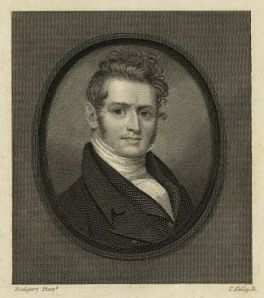Posts Tagged ‘Croakers’
The American Flag: 2009, 1819
Fourth of July thoughts on Dick of the Dead and the Croaker poems, continuing on from what I wrote a few days ago:
The biggest difference between the two bodies of work may lie in their authors’ views of the United States. Dick is a product of post-Watergate America, of the Bush years and the Patriot Act. The Croaker poems were written after the War of 1812, in which Fitz-Greene Halleck (“Croaker, Junior”) took drills as a member of the Iron Grays, a New York militia. He and his collaborator, Joseph Rodman Drake (“Croaker”), were patriots in the old-fashioned sense; they waved their flag without anxiety or qualms. Rachel Loden, who wrote Dick of the Dead, is also a patriot, but she waves her flag under threat of confiscation, in opposition to the security state; her anxieties and qualms are inevitable: Read the rest of this entry »
Inquisitor of Sprats and Compost!

Rachel Loden
On a recent train ride down through New England and New York to Washington I read Rachel Loden’s marvelous new book Dick of the Dead. I chose Loden”s book for the last leg in particular: the Dick of her title is Nixon; I thought him a good talisman to carry into the nation’s capital. A kind of rabbit’s foot, something like the leg of Brezhnev broken off white marble in the book’s third poem, “In the Graveyard of Fallen Monuments.” What I did not expect is that the book brought New York to mind more insistently than D.C.; but not the New York of my own experience, the decaying urban shell of the 1970s; nor the gentrified metropolis of today. Rather, Loden’s poems reminded me of the city mocked and celebrated and preserved for a dubious posterity in the Croaker poems of Fitz-Greene Halleck and Joseph Rodman Drake, written for the New York Evening Post in 1819 and published under the names Croaker (Drake), Croaker, Jr. (Halleck), and Croaker & Co. (Drake and Halleck together).
What do the Croaker poems and Dick of the Dead have in common? Two things: first, a tone — by which I mean a certain attitude about their subjects; and then, a luxuriation in fact, in the whimsical properties of data.
The tone is easier to describe with the Croaker poems, but reading Loden in light of them makes it easier to hear the equivalent quality in hers: the sprightly, even agitated sound of language that comes from mocking a thing and loving it at the same time. You can hear this sound in one of the Croaker poems written by Drake; a fierce bit of nonsense addressed to the surgeon general of the State of New York, sprinkled with as many exclamation marks as a poem by Frank O’Hara:
Oh! Mitchill, lord of granite flints,
Doctus, in law — and wholesome dishes;
Protector of the patent splints,
The foe of whales — the friend of fishes;
“Tom-Codus” — “Septon” — “Phlogobombos!”
What title shall we find to fit ye?
Inquisitor of sprats and compost!
Or Surgeon General of Militia!We hail thee! — mammoth of the state!
Steam frigate! on the waves of physic —
Equal in practice or debate,
To cure the nation or the phthisic:
The amateur of Tartar dogs!
Wheat-flies, and maggots that create “em!
Of mummies! and of mummy-chogs!
Of brick-bats — lotteries — and pomatum!
The sentiments are just as wonderfully unbalanced in Loden’s work; one never feels that she has seized on Nixon out of disdain, or disdain alone. And the same is true when she writes about other monsters: Cheney, Dubya, George Costanza. “Must not let on that my feelings are increasingly inappropriate,” she writes in “My Subject,” a poem that figures the writer as some kind of researcher. In a lunatic asylum? Perhaps so. But the inappropriate feelings are essential, more so than the research: the latter merely situates Loden’s language; the former gives it an audible character. Consider the sprightliness of “Nineveh Fallen”: Read the rest of this entry »
